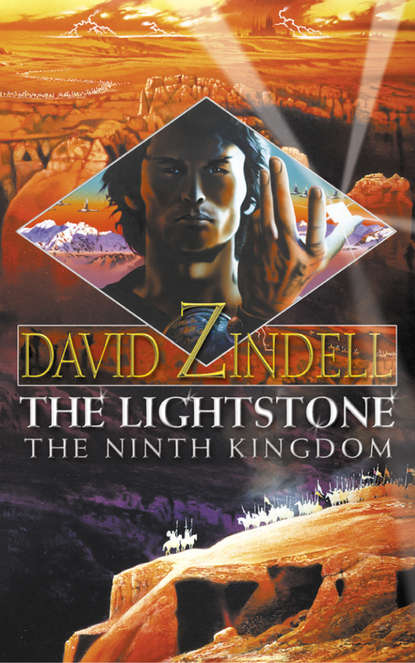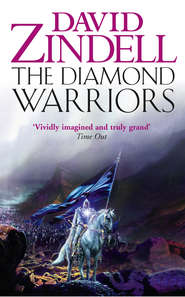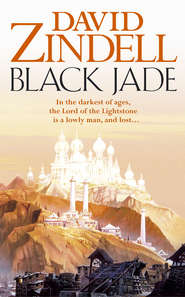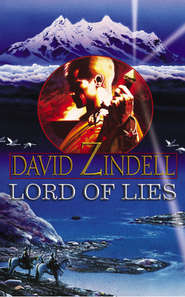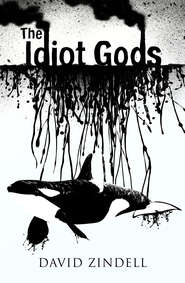По всем вопросам обращайтесь на: info@litportal.ru
(©) 2003-2024.
✖
The Lightstone: The Ninth Kingdom: Part One
Автор
Год написания книги
2019
Настройки чтения
Размер шрифта
Высота строк
Поля
‘Why have you stopped?’
In truth, I hadn’t noticed that I had stopped. Or rather, Altaru, sensing my mood, had pulled up at the edge of the road while I gazed off into the past. Before us farther up the road, along the gentle slope leading up to the castle, fields of barley glistened in the slanting light where once great buildings had stood. I remembered my grandfather telling me of the second great tragedy of my people: that in the time of Godavanni the Glorious, Morjin had again stolen the Lightstone, and its radiance had left the Morning Mountains forever. And so, over the centuries, Silvassu had diminished to little more than a backwoods city in a forgotten kingdom. The stones of its streets and houses had been torn up to build the shield wall that surrounded the castle, for the golden age of Ea had ended and the Age of the Dragon had begun.
‘Look,’ I said to Asaru as I pointed at this great wall. Atop the mural towers protecting it, green pennants fluttered in the wind. This was a signal that the castle had received guests and a feast was to be held.
‘It’s late,’ Asaru said. “We should have been home an hour ago. Shall we go?’
Maram pulled up by my side then as the wagon creaked to a halt behind me. Lord Harsha, still sitting erect in his saddle, rubbed his head above his eye-patch as his mare pawed the muddy road.
And I continued staring at this great edifice of stone that dominated the Valley of the Swans. The shield wall, a hundred feet high, ran along the perimeter of the entire hill almost flush with its steep slopes. Indeed, it seemed to arise out of the hill itself as if the very earth had flung up its hardest parts toward the sky. Higher even than this mighty wall stood the main body of the castle with its many towers: the Swan Tower, the Aramesh Tower with its ancient, crenelated stonework, the Tower of the Stars. The keep was a massive cube of carefully cut rocks as was the adjoining great hall. And all of it – the watchtowers and turrets, the gatehouses and garden walls – had been made of white granite. In the falling sun, the whole of the castle shimmered with a terrible beauty, as even I had to admit. But I knew too well the horrors that waited inside: the catapults and sheaves of arrows tied together like so many stalks of wheat; the pots of sand to be heated red-hot and poured through the overhanging parapets on any enemy who dared to assault the walls. Truly, the castle had been built to keep whole armies out, if not demons from hell. And not, it seemed, the Ishkans. My father had invited them to break bread with us in the castle’s very heart. There, in the great hall, I would find them waiting for me, and perhaps my would-be assassin as well.
‘Yes,’ I finally said to Asaru, ‘let’s go.’
I touched my ankles to Altaru’s side, and the huge horse practically leapt forward as if to battle. We started up the north road that cut through an apple orchard before curving around the edge of Silvassu’s least populated district; its slope was the most gentle of the three roads leading into the castle and therefore the easiest for the horses pulling the heavy wagon to negotiate. A short while later we passed through the two great towers guarding the Aramesh Gate and entered the castle.
In the north courtyard that day there was a riot of activity. Various wagons laden with foodstuffs had pulled up to the storehouses where the cooks’ apprentices rushed to unload them. From the wheelwright’s workshop came the sound of hammered steel, while the chandlers were busy dipping the last of the night’s tapers. Squires such as Joshu ran about completing errands assigned by their lords. We had to ride carefully through the courtyard lest our horses trample them, as well as the children playing with wooden swords or spinning tops along the flagstones. When we reached the stables, we dismounted and gave the tending of the horses over to Joshu. He took Altaru’s reins in his hands as if his life depended on the care with which he handled the great, snorting stallion – as it very well did. There, in front of the stalls smelling of freshly spread straw and even fresher dung, we said our goodbyes. Asaru and Lord Harsha would accompany Behira to the kitchens to unload the wagon before attending to their business with the steward and King. And Maram and I would seek out Master Juwain.
‘But what about your head?’ Behira said to Maram. ‘It needs a proper dressing.’
‘Ah,’ Maram said as his voice swelled with anticipation, ‘perhaps we could meet later in the infirmary.’
At this, Lord Harsha stepped between the wagon and Maram, and stood staring down at him. ‘No, that won’t be necessary,’ he said to him. ‘Isn’t your Master Juwain a healer? Well, let him heal you, then.’
Asaru moved closer to me and laid his hand on my shoulder. ‘Please give Master Juwain my regards,’ he said.
And then, as his eyes flashed like a dark sky crackling with lightning, he added, Tonight there will be a feast to be remembered.’
Maram and I crossed the courtyard then, and walked through the middle ward which was full of chickens squawking and running for their lives. After passing through the gateway to the west ward, we found the arched doorway to the Adami Tower open. I went inside and fairly raced up the worn steps that wound up through the narrow staircase; Maram, however, puffed along behind me at a slower pace. I couldn’t help reflecting on the fact that the stairs spiraled clockwise as they rose to the tower’s upper floors. This allowed a defender to retreat upwards while wielding his sword with his right hand, whereas an attacker would have to lean around the corner in the wrong direction to wield his. I couldn’t help noticing as well the castle’s ever-present smell: rusting iron and sweating stone and the sharpness of burning tallow that over the centuries had coated the walls and ceilings with layers of black smoke.
Master Juwain was in the guest chamber on the highest floor. It was the grandest such room in the castle – indeed, in all of Mesh – and many would argue that it should have been reserved for the Ishkan prince or even King Kiritan’s emissaries. But by tradition, whenever a master of the Brotherhoods was visiting, he took up residence there.
‘Come in,’ Master Juwain’s voice croaked out after I had knocked at the door to his chamber.
I opened this great, iron-shod slab of oak and stepped into a large room. It was well-lit, with the shutters of its eight arched windows thrown open. In most other rooms of the castle, this would have let in gusts of cold air along with sunlight. But the windows here were some of the few to be fitted with glass panes. Even so, the room was rather cool, and Master Juwain had a few logs burning in the fireplace along the far wall. This, I thought, was an extravagance. As were the chamber’s other appointments: the tiled floor, covered with Galdan carpets; the richly-colored tapestries; the shelves of books set into the wall near the great, canopied bed. As far as I knew, there was only one other true bed in the castle, and there my father and mother slept. The whole of the chamber bespoke a comfort at odds with the Brotherhoods’ ideal of restraint and austerity, but the great Elemesh had proclaimed that these teachers of our people should be treated like kings, and so they were.
Valashu Elahad – is that you?’ Master Juwain called out as I entered the room. He was as short and stocky as I remembered, and one of the ugliest men I had ever seen.
‘Sir,’ I said, bowing. ‘It’s good to see you again.’
He was standing by one of the windows and looking up from a large book that he had been reading; he returned my bow politely and then stepped over to me. ‘It’s good to see you,’ he said. ‘It’s been almost two years.’
To look upon Master Juwain was to be reminded at first of vegetables – and not the most attractive ones at that. His head, large and lumpy like a potato, was shaved smooth, the better to appreciate the puffy ears that stood out like cauliflowers. His nose was a big, brown squash, and of his mouth and lips, it is better not to speak. He clasped me on the shoulder with a hand as tough as old tree roots. Although he was first and foremost a scholar – perhaps the finest in all of Ea – he liked nothing better than working in his garden and keeping close to the earth. Although he might advise kings and teach their sons, I thought he would always be a farmer at heart.
‘To what honor,’ he asked, ‘shall I attribute this visit after being ignored for so long?’
His gaze took in the rain-stained cloak that Asaru had lent me as he looked at me deeply. The saving feature of his face, I thought, were his eyes: they were large and luminous, all silver-gray like the moonlit sea. There was a keen intelligence there and great kindness, too. I have said that he was an ugly man, and ugly he truly was. But he was also one of those rare men transformed by a love of truth into a being of great beauty.
‘My apologies, sir,’ I told him. ‘But it was never my intention to ignore you.’
Just then Maram came wheezing and panting into the room. He bowed to Master Juwain and then said, ‘Please excuse us, sir, but we needed to see you. Something has happened.’
While Master Juwain paced back and forth rubbing his bald head, Maram explained how we had fought for our lives in the woods that afternoon. He conveniently left out the part of the story in which he had shot the deer, but otherwise his account was reasonably accurate. By the time I had spoken as well, the room was growing dark.
‘I see,’ Master Juwain said. His head bowed down in deep thought as he dug his foot into the priceless carpet. Then he moved over to the window and gazed out at Telshar’s white diamond peak. ‘It’s growing late, and I want to get a good look at this arrow you’ve brought me. And your wounds as well. Would you please light the candles, Brother Maram?’
While I tightly gripped the black arrow, still wrapped in my torn shirt, Maram went over to the fireplace where he stuck a long match into the flames to ignite it. Then he went about the room lighting the many candles in their stands. As the soft light of the tapers filled the room, I reflected on the fact that some two thousand candles would be burned throughout the castle before the night was through.
‘Here, now,’ Master Juwain said as his hand closed on Maram’s arm. He pulled him over to the writing table, which was covered with maps, open books and many papers. There he sat him down in the carved, oak chair. ‘We’ll look at your head first.’
He went over to the basin by one of the windows and carefully washed his hands. Then, from beneath the bed, he retrieved two large wooden boxes which he set on the writing table. In the first box, as I saw when he opened it, were many small compartments filled with unguents, bottled medicines and twists of foul-smelling herbs. The second box contained various knives, probes, clamps, scissors and saws – all made of gleaming Godhran steel. I tried not to look into this box as Master Juwain lifted out a roll of clean white cloth and set it on the table.
It didn’t take him very long to clean Maram’s wound and wrap his head with a fresh dressing. But for me, standing by the window and looking out at the night’s first stars as I tried not to listen to Maram’s groans and gasps, it seemed like an hour. And then it was my turn.
After pulling back Asaru’s cloak, I took Maram’s place on the chair. Master Juwain’s hard, gnarly fingers gently probed my bruised chest and then touched my side along the thin red line left by the arrow.
‘It’s hot,’ Master Juwain said. ‘A wound such as this shouldn’t be so hot so soon.’
And with that, he dabbed an unguent on my side. The greenish cream was cool but stank of mold and other substances that I couldn’t identify.
‘All right,’ Master Juwain said, ‘now let’s see the arrow.’
As Maram crowded closer and looked on, I unwrapped the arrow and handed it to Master Juwain. He seemed loath to touch it, as if it were a snake that might at any moment come alive and sink its venomous fangs into him. With great care he held it closer to the stand of candles burning by the table; he gazed at the coated head for a long time as his gray eyes darkened like the sea in a storm.
‘What is it?’ Maram blurted out. ‘Is it truly poison?’
‘You know it is,’ Master Juwain told him.
‘Well, which one?’
Master Juwain sighed and said, ‘That we shall soon see.’
He instructed us to stand off toward the open window, and we did as he bade us. Then, from the second box, he produced a scalpel and a tiny spoon whose bowl was the size of a child’s fingernail. With a meticulousness that I had always found daunting, he used the scalpel to scrape off a bit of the bluish substance that covered the head of the arrow. He caught these evil-looking flakes with a sheet of white paper, then funneled them into the spoon.
‘Hold your breath, now,’ he told us.
I drew in a draft of clean mountain air and watched as Master Juwain covered his nose and mouth with a thick cloth. Then he held the spoon over one of the candles. A moment later, the blue flakes caught fire. But strangely, I saw, they burned with an angry, red flame.
Still holding the cloth over his face, Master Juwain set down the spoon and joined us by the window. I could almost feel him silently counting the seconds to every beat of my heart. By this time, my lungs were burning for air. At last Master Juwain uncovered his mouth and told us, ‘Go ahead and breathe – I think it should be all right now.’
Maram, whose face was red as an apple, gasped at the air streaming in the window, and so did I. Even so, I caught the faintness of a stench that was bitter beyond belief.
‘Well?’ Maram said, turning to Master Juwain, ‘do you know what it is?’
‘Yes, I know,’ Master Juwain said. There was a great sadness in his voice. ‘It’s as I feared – the poison is kirax.’
‘Kirax,’ Maram repeated as if he didn’t like the taste of the word on his tongue. ‘I don’t know about kirax.’
‘Well, you should,’ Master Juwain said. ‘If you weren’t so busy with the chambermaids, then you would.’





